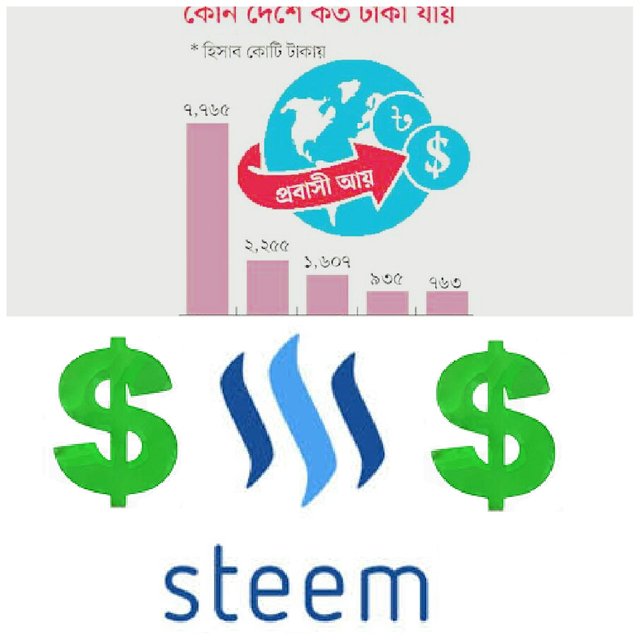Foreigners take Tk 16 billion in a year

Foreign nationals working in Bangladesh carry about 200 million dollars in remittance or expatriate income in a legal way, which is equivalent to Tk 16,000 crore in Bangladeshi currency. These foreign nationals work in different sectors including export-oriented garments.
The Pew Research Center, a US research firm, has calculated the expansion of expatriate income from Bangladesh. They studied the latest estimation of the World Bank economists. According to the study, a total of $ 12.5 million in foreign countries went abroad in 2016 as expatriate income. Countries which have this meaning include China, Indonesia, Malaysia, India, USA, Vietnam, Nepal, Thailand, Japan, Norway and the United Kingdom.
As a government, about 85 thousand foreign citizens work in Bangladesh. However, the concerned people say that the number of foreign nationals working in Bangladesh and the amount of expatriate income sent to their country will be even more. Because, in most cases foreign nationals work in this country without work permit or work permit. Besides, they send the expatriates' income to the country illegally. In a roundtable organized by the National Research Institute Policy Research Institute (PRI) on Jan 20, Bangladesh Enterprise Institute (BIE) President Faruk Sobhan said that the Indian industry in Bangladesh's industrial sector and business-traders take 32 billion rupees annually to India. He said this information by pointing to an interaction with Finance Minister Abul Maal Abdul Muhith.
Most foreigners work in Bangladesh, in the readymade garment sector. Asked why foreigners get the job, former president of Bangladesh Employers Federation and garment sector trader Fazlul Haque
In the first light, the main reason behind this is the lack of job oriented education and skill deficit in the country. The demands of the industry are not taught in the educational institutions accordingly. He said, "The young people of this country run behind the general education. But the demand for educated private education in the private sector is low. As a result, young people are not getting jobs because of higher education, frustration is increasing.
How many foreigners are working
Home Minister Asaduzzaman Khan has given an account of how foreign citizens work in Bangladesh in February in the parliament. According to his estimates, 85 thousand 486 foreign nationals work in this country, half of them are Indians. The number of Indians is 35 thousand 386 and Chinese 13 thousand and 286 people. Then there are Japan-4 thousand 93 people. In addition, Korea's 4, 93 people, 3,395 people from Malaysia and 3,777 of Sri Lanka work in Bangladesh. Thailand, United Kingdom, United States of America, Germany, Singapore and Turkey also have a significant number of people working in different sectors of Bangladesh.
There are allegations, however, that a large number of foreign nationals visit Bangladesh in tourist visa. They are not officially included. As Bangladesh Tourism Board, 7.7 million foreign nationals came to Bangladesh in 2017.
According to the World Bank, Sri Lanka has no significant income from Bangladesh. But many people of Sri Lanka work in the garment sector in this country.
Bangladesh Investment Promotion Authority (BIDA), Bangladesh Export Processing Zones Authority (BEPZA) and NGO Affairs Bureau, allow foreign nationals to work in the country. In most cases this permission is taken from the Bidar. The organization informs that, in 2017, 3,171 foreigners were allowed to work. On the other hand, 4 thousand 113 people have been renewed. BEPZA said that now there are 2500 foreign citizens working in export processing zones. Foreigners' pay is two to three times higher than the Bangladeshi.
Deficit middle stage
In the last one month, this reporter is talking with many large organizations to know that foreigners usually work in any type of post in Bangladesh. They say that foreigners mainly work in the production management of the factory, the management of machinery, the standard management and middle-level management of the organization. Many foreigners also work in Merchandising and Buying Houses of the garment sector.
BEPZA says foreigners work in high tech and product manufacturing processes in export processing zones. Along with this, foreign nationals were also appointed for the post of Managing Director and Director.
Asked about the country's leading industrial group ACI Chairman M Anis Udd Dowla who told Prothom Alo that the country's higher education lacks English knowledge. They do not even learn anything in their hands. He gave an example of hiring a welding supervisor in his own factory and said, "An engineer interested in the welding supervisor's office does not know how to do welding. He was not taught in the hands of this. I learned welding myself but myself. '
In general, candidate is more in the rank, less in the technical field
Employees are employed almost every month in Pran-RFL Group, the leading industrial group of the country. There is a lot of difference in the number of general education posts and technical posts, said company director (Marketing) Kamruzzaman Kamal. He said, 'Our country has more than the number of educated educators. Technically skilled people are getting less. '
Most of the students of the country are studying in general education. They are less interested in technical issues. In technical education, higher education has more interest among the mercenaries. But the organizers say that skilled people in Bangladesh need moderate level. There are fewer merit rates. The entrepreneurs believe that, after passing the Higher Secondary examination in the country, there is a need to restrict higher education in general. On the contrary, tendency towards technical education will be created.
President of Dhaka Chamber of Commerce and Industry (DCCI) Abul Quasem Khan said that countries such as Germany create manpower according to their needs. It is also necessary in Bangladesh